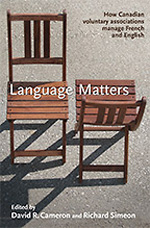
Language Matters: How Canadian Voluntary Associations Manage French and English
Canada is an officially bilingual country. But how do the voluntary associations that make up civil society manage linguistic diversity? In the 1960s, a study by Vincent Lemieux and John Meisel for the Royal Commission on Bilingualism and Biculturalism Commission revealed that Canadian associations were often paralyzed by internal conflicts over language. Language Mattersexamines whether this remains the case.
The contributors present case studies or life histories of diverse associations, ranging from business organizations and municipal associations to groups concerned with equality and social justice. Several replicate Lemieux and Meisel’s pioneering enquiry; others look at newer groups. Each contribution examines key turning points in the given association’s history and explores how its mandate, leadership, relationship to the federal and provincial governments, and shifting options in the political arena — independence, sovereignty association, or symmetrical and asymmetrical federalism — shaped its response to linguistic diversity.
Voluntary associations have found diverse ways to accommodate linguistic differences in a manner acceptable to Canada’s two great linguistic communities. Language Matters provides a deeper understanding of the language dynamic in Canada and offers solutions to groups and governments trying to manage difference.